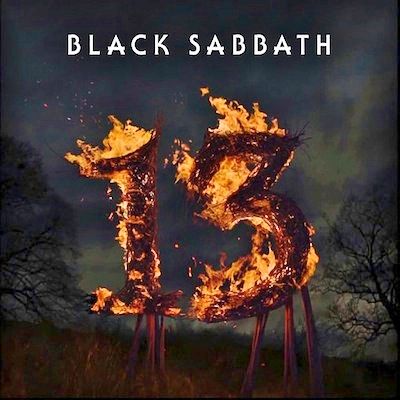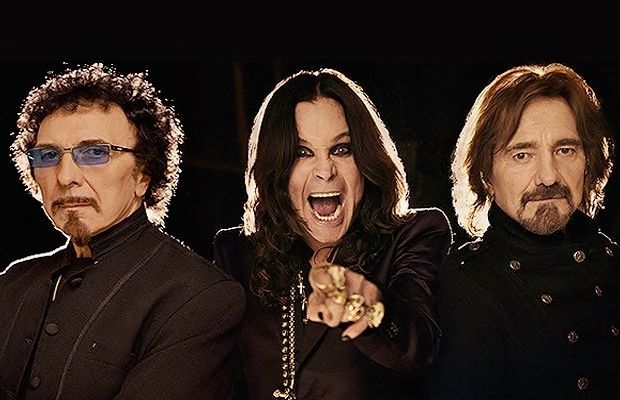Post by Erik Rupp on Jun 11, 2013 15:44:59 GMT -5


In 2007, after a highly successful tour fronted by Ronnie James Dio as Heaven & Hell, it seemed unlikely that Black Sabbath would ever do a new album with original lead singer Ozzy Osbourne.
They had attempted to write and record an album with Ozzy in the late 1990's following the reunion tour of their original line-up, but musical differences kept that project from getting off the ground. So when their musical partnership with Dio had successfully been rekindled, and all the band members were happy with the arrangement, it seemed as if the Ozzy Osbourne era for Black Sabbath would be relegated to a part of their history. None of the band members were getting any younger, and it seemed as if the Dio era line-up would continue on until the band decided to retire.
But when Ronnie James Dio died from stomach cancer in May of 2010 the future of Heaven & Hell and Black Sabbath became shrouded in mystery. Would they get a new singer and continue on as Heaven & Hell? That idea was quickly rejected. Would original Sabbath members Tony Iommi (guitar) and Geezer Butler (bass) form a new band? Or would they reunite yet again with Ozzy Osbourne?
As it turned out, they reunited with the entire original Black Sabbath line-up, also including original drummer Bill Ward. The announcement was made at a massive press conference that they would do a short tour, record a new album, and then tour in support of that album. Ahhh, the best laid plans.
Tony Iommi developed cancer, forcing the cancellation of all but one of the initial tour dates, and then Bill Ward left the band, citing contractual problems. Later on both Ozzy Osbourne and Tony Iommi noted that Ward was not in shape to record an album and tour. Whatever drama was occurring behind the scenes was beside the point – Ward was out, and Brad Wilk of Rage Against The Machine was in thanks to the suggestion of producer Rick Rubin (who was signed to produce the new Sabbath album).
But would the album be any good? The Heaven & Hell album, The Devil You Know, was a good album, but not as good as the three previous albums from the Dio line-up. It was a minor disappiontment to many fans. Would the new album be a similar (or worse) disappointment?
In a word, no.
13 finds Black Sabbath reaching back to their first six studio albums for inspiration, especially the first three of those albums. Black Sabbath hasn't sounded this black in a long, long time, arguably since the 1983 Born Again album which featured Iommi, Butler, Ward, and Deep Purple vocalist Ian Gillan. And stylistically, none of the Black Sabbath albums after Sabbath Bloody Sabbath have fully fit in with the style of the first three or four Sabbath studio albums as well as 13 does. It's rare that a band can reach back that far and fully recapture both the spirit and the style of their earlier work, but Black Sabbath succeeded wildly on both counts here.
Sabbath hired Rick Rubin to produce the album, and that choice definitely helped them achieve the desired results, but not without a couple minor flaws.
First, while the material on 13 is very, very good (occasionally great), the album drags a bit. The pacing is sludgy, like many of the songs. Without a couple uptempo songs to break up the monotony of slow tempos the songs start to become a little tedious despite their quality. Second, some of the songs are just too damned long. Lead single, "God Is Dead?," is a great example at nearly nine minutes in length it would have been much more effective as a shorter, tighter, and less repetitive seven or seven and a half minutes long. Unfortunately, that's not the only song of which this criticism is valid.
On the other hand, there isn't a single song here that isn't worthy of inclusion as a bonus track at the very least (even if a couple of the bonus tracks should have traded places with a couple of their slower counterparts on the standard album).
The band opens the song with 2:40 of pure, "Black Sabbath," style sludge - which wouldn't be a bad thing at all (since that is the good kind of musical sludge) if not for the follow up track, the aforementioned, "God Is Dead?" This section of, "The End Of The Beginning," is clearly an attempt to re-write their title track, or at the very least write something similar. Since, "God Is Dead?," is essentially a full on rewrite/recreation of their namesake song this becomes redundant and unnecessary. Excise the first 2:40 (as good as it is for that kind of thing) and focus on the rest of, "The End Of The Beginning," and it's nearly brilliant. Once the tempo picks up to an upper midtempo pace as it does that that point the song becomes a great Heavy Metal song in the classic Black Sabbath style. One that would have been a highlight on any of their classic albums.
And as for, "God is Dead?," how good is it, really? It's good, very good, but too long and too repetitive. As for the derivative nature of the song? Well, it's not a flat out rip from the earlier song, just one in the exact same style and mood, including the faster part towards the end. It is another worthy song, just one that could have benefitted from some trimming. Addition by subtraction would have been the net result. Still, it is a good song as it is.
One of the album's highlights (and it's most uptempo track, even though it's only really a midtempo song) is, "Loner." This is a song that could have been written for Heaven and Hell (the album) or Master Of Reality and fit in equally well. It's got a timeless Sabbath style that crosses over different eras in their history. There is no doubt that this is Black Sabbath even before the singing starts. Great song.
And then Black Sabbath borrows heavily from Black Sabbath. "Zeitgeist," is a thinly veiled rewrite of Paranoid's, "Planet Caravan," right down to the bongos and the effects on Ozzy's vocals. They get away with it, however, because the song is excellent. Tony Iommi's acoustic guitar work is suberb (nothing technically brilliant, but all of it very tasteful and atmospheric), and Geezer's bass playing is just as good if not better.
"Age Of Reason," is another epic track at seven minutes long, only this one is a little less repetitive and more tightly arranged. And the riffs are mammoth in size and scope, as one would expect from a great Black Sabbath album. This one actually gets a little progressive in the middle section, sounding like a bigger, beefier mid 70's Rush, before settling back in to solid Black Sabbath territory. This is a great track, yet another of the album's highlights.
The next track is nearly equally great, but the problem is that the intro riff sounds like it's part of the previous song (so they tend to run together). But after that section, the song settles into a, "Children of the Grave," type song, with a fantastic riff (one that reminds me of another Sabbath riff from a song ending, but I can't remember which one). This is a much needed shot of energy that the album desperately needed at this point, even if this one is still just a mid-tempo song.
The next song is one that is the absolute highlight of the album for some, and an example of the overuse of the slow tempos for others. "Damaged Soul," owes a lot to both Cream and Jimi Hendrix as Iommi reaches back to his roots for the music on this one. If this song were only five or even six minuts long it might have worked better, but at almost eight minutes long it does tend to trag a bit, and at that point the album starts to become a little tedious and stuck in a rut. The use of harmonica is an obvious attempt to recall, "The Wizard," from the band's revolutionary debut album, but where that song had a lot of energy, this one doesn't have much energy at all until over six minutes in. That is too long to go at the tempo the song had been stuck in up to that point. Granted, the faster part of the song is great, and the rest of the song is very, very good, but that's just too long to be stuck at 16 rpm. Especially given the number of slow songs on the album.
"Dear Father," closes out the standard edition of the album, and it (again) is a slow-ish, sludgy song. This one, however, has echoes of the Ronnie James Dio era musically, especially the final album with him, The Devil You Know. The crossover between styles and eras again makes for a timeless song, rather than one associated with one period in time. There is one gratuitous bit of modulation in the faster section of the song that really doesn't work, but is saved from disaster by a further modulation to a minor key before transitioning back to the main, sludgy riff. Overall this is a good song, but one that may have worked better as a bonus track (with one of the faster bonus tracks taking it's place on the standard edition of the album). Of course, the song closes with the same rain and church bell that the first album opens up with, and that is a very nice (and fitting) touch to end what may be Black Sabbath's final album.
Rick Rubin's production is a success in some respects, but not in others. While he did help select a group of songs that sound appropriately like classic Ozzy era Black Sabbath, further input into arrangements and even some riffs and vocal melodies might have been helpful. Too many songs that are just too long becomes tedious, as does too many songs with slow, sludgy tempos and riffs. The pacing of the album suffers as a result.
Now, that might be a minor quibble with an album this good, but the album could have been even better with a stronger producer who has the ability (or inclination) to offer songwriting and arranging guidance at the pre-production stage.
On the other hand, Rubin did a fantastic job of getting some great performances out of the band. They have never sounded better or tighter as a unit, and that's quite an accomplishment given the length of time between Sabbath's classic material and this album. And yet another feather in Rubin's cap is the fact that Sabbath has literally never, in any era, had an album that sounded this good sonically. The bass tone here is one of the best I've ever heard from anyone, and the mix is absolutely fantastic.
13 is definitely a worthy successor to Black Sabbath, Paranoid, Master Of Reality, Vol. 4, Sabbath Bloody Sabbath, and Sabotage, and is arguably as good as any of them, if not better.
Standard Edition 4.25/5

